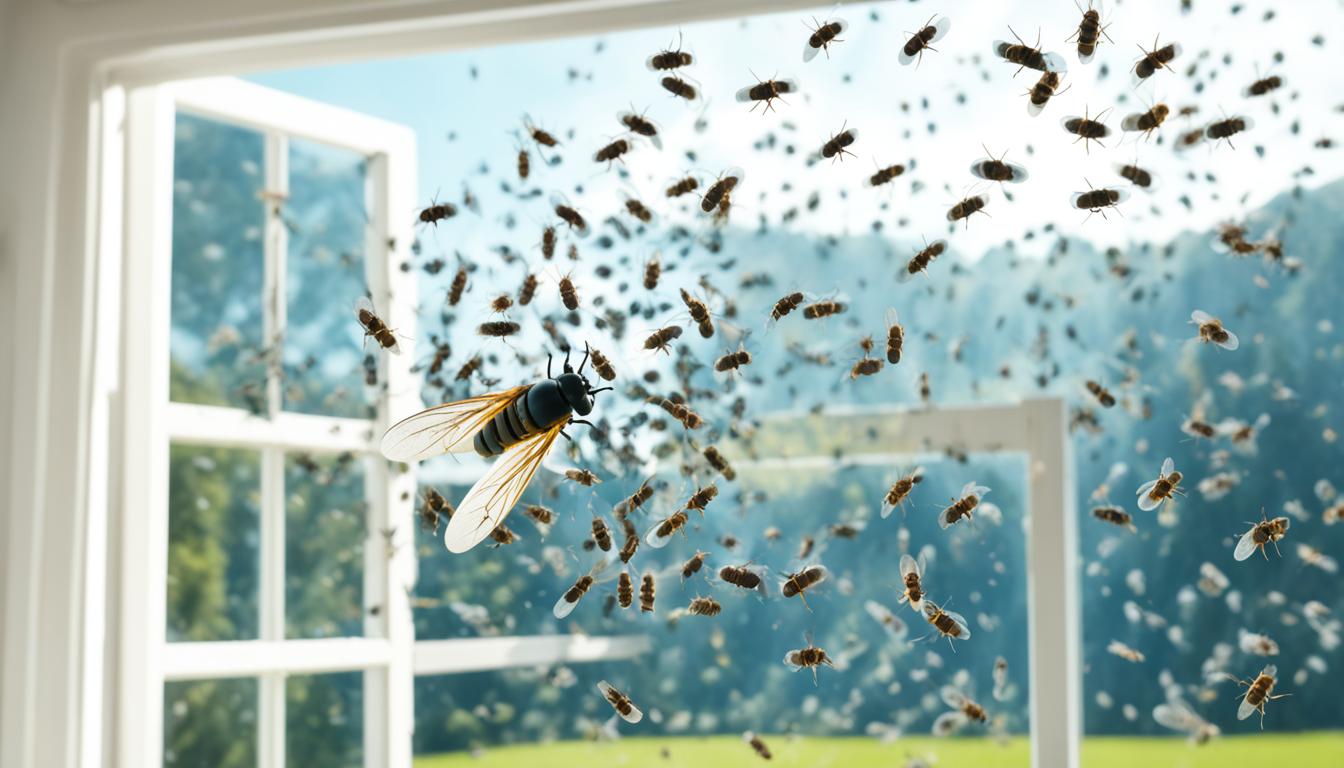If you’re tired of dealing with pesky flies buzzing around your home, you’re not alone. Flies can be a major nuisance, but with the right fly control methods, you can eliminate them and enjoy a fly-free environment. In this article, we will explore effective strategies to get rid of flies and provide you with the information you need to take back your home.
Understanding House Flies and Their Behavior
House flies, scientifically known as Musca domestica, are grey or black insects with large red eyes and nearly translucent wings. They are attracted to decaying organic matter and lay their eggs on food waste, rotting meat, and feces. The eggs hatch into legless white maggots, which develop into pupae and then adult flies. House flies are mainly attracted to areas with poor sanitation and openings in homes through which they can enter.
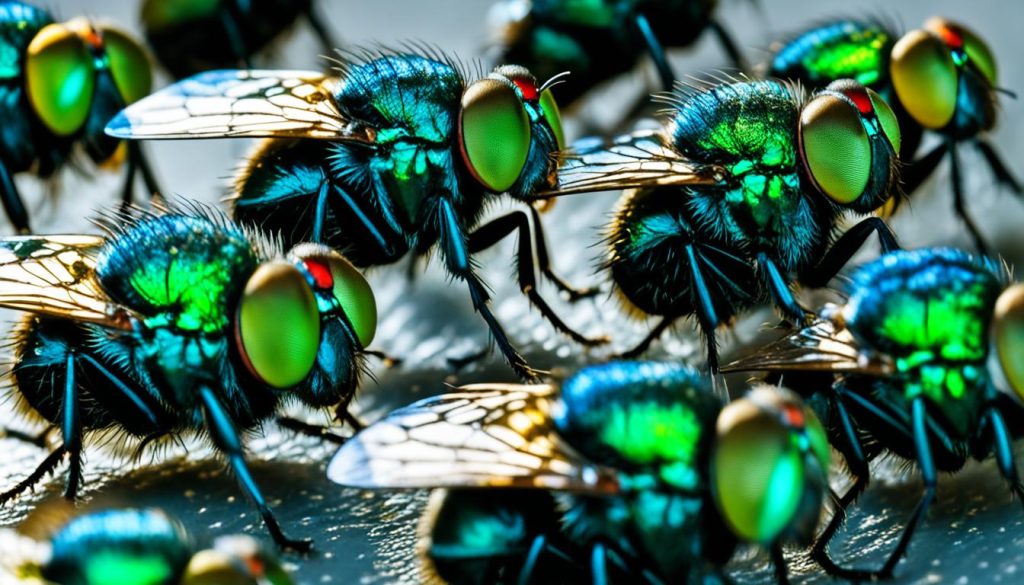
House flies, as one of the most common types of flies, can be a nuisance and pose a threat to our health. Understanding their breeding sites and the causes of house fly infestations is crucial in effectively managing and controlling them.
The Breeding Sites of House Flies
House flies prefer breeding sites that provide suitable conditions for their eggs to develop. Some common breeding sites include:
| Common Breeding Sites | Examples |
|---|---|
| Garbage areas | Trash cans, dumpsters |
| Animal waste | Manure, pet waste |
| Decaying organic matter | Compost piles, rotting fruits and vegetables |
| Outdoor areas with poor sanitation | Abandoned buildings, sewers |
It’s important to identify and eliminate these breeding sites to prevent house fly infestations. Regular cleaning and proper waste management are essential in reducing the attractants for house flies.
Causes of House Fly Infestations
House fly infestations can be caused by several factors, including:
- Poor sanitation: Areas with poor hygiene and cleanliness are more likely to attract house flies.
- Openings in homes: House flies can enter homes through gaps around doors, windows, and vents.
- Food sources: Uncovered food, exposed garbage, and decaying organic matter serve as feeding and breeding grounds for house flies.
- Pet waste: Accumulated pet waste can attract house flies and contribute to infestations.
By addressing these causes and implementing preventive measures, you can reduce the risk of house fly infestations in your home.
How to Get Rid of Flies Effectively?
Natural Remedies to Prevent and Deter Flies
House flies can be a persistent annoyance in the home, but there are eco-friendly ways to naturally deter them. By utilizing natural fly repellents, homemade fly traps, and the power of plants, you can effectively prevent and reduce fly infestations in your home.
1. Apple Cider Vinegar and Dish Soap
A simple and effective homemade fly trap can be created using apple cider vinegar and dish soap. Flies are attracted to the sweet scent of vinegar and are subsequently trapped in the soapy liquid. Here’s how to make it:
- Fill a shallow dish or jar with a small amount of apple cider vinegar.
- Add a few drops of dish soap to the vinegar.
- Stir the solution gently to create a soapy mixture.
- Place the trap near areas where flies are commonly found.
2. Plant Herbs to Repel Flies
Another effective way to keep flies at bay is by planting herbs that naturally repel them. Flies are deterred by the strong scents of certain herbs, making them less likely to invade your space. Consider planting the following herbs near doorways, windows, and outdoor seating areas:
| Herb | Scent |
|---|---|
| Basil | Sweet, spicy |
| Mint | Minty |
| Lavender | Floral, herbal |
| Lemongrass | Citrusy |
3. Essential Oils as Fly Repellents
Essential oils have powerful scents that can effectively repel flies. You can create your own natural fly repellent spray by diluting a few drops of essential oil in water, and then spraying it in the desired areas. Lavender and lemongrass oils are particularly effective against flies. Alternatively, you can soak cotton balls in the essential oils and place them strategically around your home to deter flies.
4. Fly Paper or Sticky Traps
Fly paper, also known as sticky traps, is a traditional method for attracting and capturing flies. These sticky strips or rolls can be hung in areas where flies are often present, such as near windows, doors, or garbage bins. As flies are naturally drawn to the surface, they become stuck and unable to escape.
By incorporating these natural methods into your fly control routine, you can not only deter flies but also maintain a healthier and more enjoyable living environment.
Chemical Solutions for Eliminating House Flies
If natural remedies do not effectively eliminate house fly infestations, chemical-based solutions can be used. There are several insecticides specifically formulated to target and control flies. These insecticides can be applied as sprays, used in baits or traps, or as residual treatments to eliminate flies and prevent their return.
Pyrethroids
One common type of insecticide used for fly control is pyrethroids. Pyrethroids are synthetic insecticides derived from chrysanthemum flowers. They work by paralyzing the nerves of flies, leading to their death. Pyrethroids are effective in quickly eliminating flies and are commonly available in aerosol sprays, ready-to-use formulations, and concentrated solutions that can be diluted and applied using a sprayer.
Imidacloprid
Another chemical used for fly control is imidacloprid. It is often found in bait traps that attract flies and then poison them upon ingestion. Imidacloprid targets the nervous system of flies, effectively controlling their population. Bait traps containing imidacloprid can be strategically placed in areas where flies are commonly found, such as near trash bins, outdoor dining areas, or entry points in your home.
When using chemical solutions for fly control, it is important to carefully follow the instructions provided by the manufacturer. Ensure that the products are appropriate for the intended use, taking into consideration the safety of humans and pets. Always store and handle insecticides according to the guidelines and keep them out of reach of children.
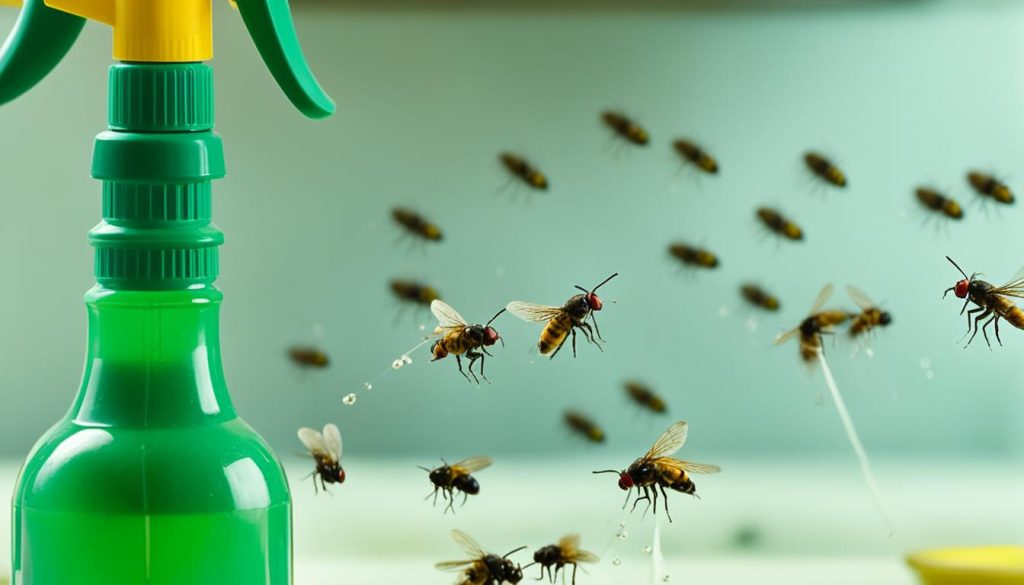
Preventive Measures to Keep Flies Away
The best way to prevent fly infestations and manage house flies is to take proactive measures to keep them out of your home. By implementing these house fly prevention tips, you can create a fly-free environment and ensure a hygienic living space for you and your family.
1. Seal doors and windows
To prevent flies from entering your home, it is important to seal all openings, including doors and windows. Inspect for cracks or gaps and use weatherstripping or caulk to seal them properly. Installing screens on windows and doors can also serve as an effective barrier against flies while allowing ventilation.
2. Ensure proper sanitation and waste management
Inside your home, maintaining cleanliness and proper waste management is essential to deter flies. Follow these house fly management tips:
- Clean up food waste and crumbs promptly.
- Use trash cans with tight-fitting lids to prevent flies from accessing garbage.
- Regularly clean and disinfect pet waste areas to prevent fly breeding.
- Practice good hygiene by keeping kitchen counters and dining areas clean.
3. Conduct regular outdoor inspections
Flies can breed in outdoor areas, contributing to indoor infestations. Regularly inspect your property for potential breeding grounds and take appropriate measures to eliminate them. Pay attention to:
- Garbage cans and dumpsters
- Compost bins
- Animal waste areas
- Standing water sources
4. Consider using fly traps and repellents
In addition to preventive measures, you can also use fly traps and repellents as a proactive approach to fly management. Fly paper or sticky traps can effectively capture flies, while fly repellents containing natural ingredients can help deter them from specific areas in your home.
Follow these preventive measures to keep flies away and maintain a fly-free environment in your home. By implementing these tips, you can prevent fly infestations and ensure a clean and healthy living space.
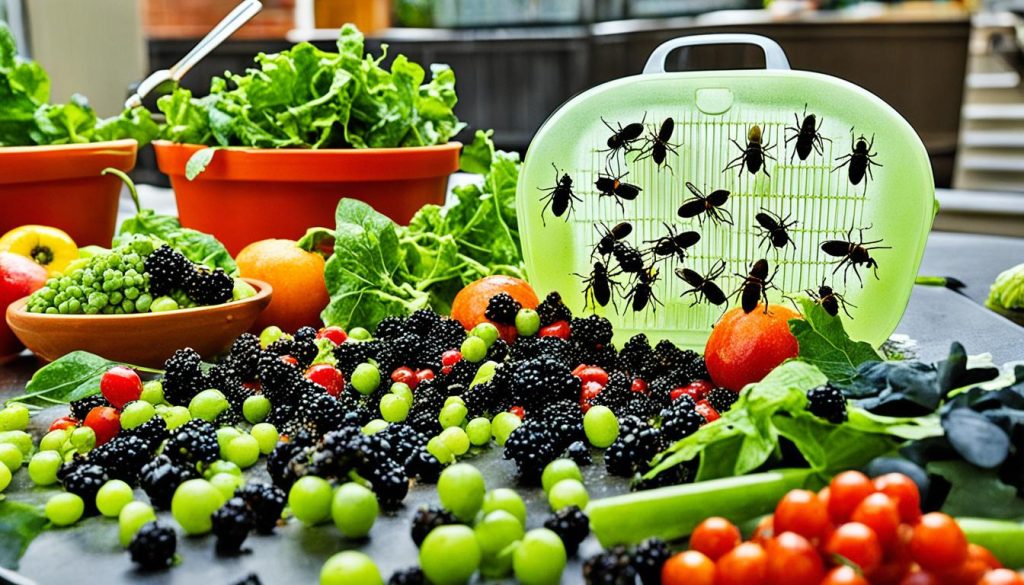
How to Eliminate Fruit Flies and Gnats?
Fruit flies and gnats can be a persistent annoyance inside homes. To effectively get rid of these pests, it is essential to eliminate their sources of food and breeding. Follow these simple steps to control fruit flies and gnats:
- Clean up ripe fruits and vegetables: Ensure that any overripe or rotting fruits and vegetables are promptly thrown away. These serve as attractive food sources for fruit flies and gnats.
- Address spills and organic matter: Any spills or organic matter, such as food scraps or compost, should be cleaned up thoroughly. Regularly empty trash and keep garbage cans tightly sealed.
- Use fruit fly traps: Create vinegar and dish soap traps by mixing equal parts of apple cider vinegar and dish soap in a small container. Place the trap near areas where fruit flies and gnats are commonly seen. The scent of vinegar attracts them, and the dish soap traps them.
- Utilize herbs and essential oils: Planting herbs like eucalyptus and mint near windows and doorways can act as natural deterrents to fruit flies and gnats. Additionally, placing essential oils with repellent properties, such as eucalyptus or mint, around problem areas can discourage these pests.
- Keep food covered: Fruits, vegetables, and other food items should be stored in sealed containers or kept covered to prevent fruit flies and gnats from accessing them.
Implementing these measures can significantly reduce fruit fly and gnat infestations in your home. By removing their sources of food and creating deterrents, you can effectively control and prevent fruit fly and gnat problems.
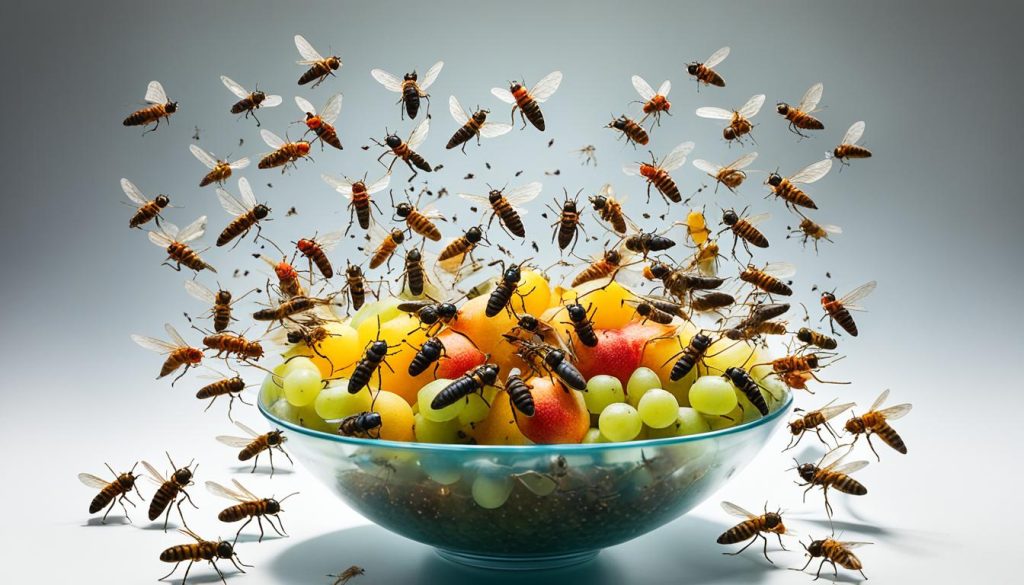
The Health Risks Associated with House Flies
House flies can pose significant health risks to humans. These pesky insects carry various pathogens and bacteria on their bodies and in their feces, making them potential transmitters of diseases. Exposure to house flies can lead to the transmission of harmful microorganisms that cause illnesses such as:
- Food poisoning
- Cholera
- E. coli infections
- Typhoid fever
- Dysentery
To protect your health, it is crucial to keep flies away from food and maintain proper hygiene. Flies have the ability to contaminate surfaces and food items, leading to the spread of diseases and infections. By following effective fly control methods and adopting hygienic practices, you can reduce the risk of fly-borne illnesses in your home.
If you encounter a significant fly infestation, it is advisable to seek professional assistance to address the issue promptly and effectively.
| Disease | Symptoms | Prevention |
|---|---|---|
| Food poisoning | Abdominal pain, diarrhea, nausea, vomiting | Avoid leaving exposed food, clean food preparation areas, practice good hand hygiene |
| Cholera | Severe diarrhea, dehydration | Ensure access to clean drinking water, maintain proper sanitation |
| E. coli infections | Abdominal cramps, bloody diarrhea | Cook meat thoroughly, wash fruits and vegetables, practice good food handling practices |
| Typhoid fever | Fever, headache, stomach pain, rash | Ensure access to clean drinking water, maintain proper sanitation, practice good hand hygiene |
| Dysentery | Abdominal pain, bloody diarrhea | Ensure access to clean drinking water, maintain proper sanitation, practice good hand hygiene |
Conclusion
Controlling and preventing house fly infestations is crucial for maintaining a clean and healthy home environment. By implementing natural remedies, using chemical solutions when necessary, and practicing good preventive measures, you can effectively eliminate and deter flies from your home. Regular cleaning, proper waste management, and maintaining a hygienic environment are key to preventing fly infestations. Remember to address potential breeding grounds and eliminate attractants to keep your home fly-free.
FAQs
Are there chemical solutions to eliminate house flies?
Yes, there are chemical solutions available to control house flies. Pyrethroids, derived from chrysanthemum flowers, can be used to target and kill flies by paralyzing their nerves. Another chemical, imidacloprid, is often found in bait traps for flies.
How can I prevent fly infestations in my home?
To prevent fly infestations, ensure doors and windows are properly sealed and use screens to keep flies out. Maintain good sanitation and waste management practices, including cleaning up food waste and crumbs, using trash cans with lids, and regularly cleaning pet waste areas. Regular inspections of outdoor areas to eliminate potential breeding grounds are also important.
How can I get rid of fruit flies and gnats?
To eliminate fruit flies and gnats, it’s important to eliminate their food and breeding sources. Clean up ripe fruits, spills, and rotting organic matter. You can use vinegar and dish soap traps, plant herbs or use essential oils like eucalyptus and mint, and keep food covered to deter and eliminate fruit flies and gnats.
What health risks are associated with house flies?
House flies can carry pathogens and bacteria on their bodies and in their feces, which can cause food poisoning, cholera, E. coli infections, typhoid fever, dysentery, and other diseases. It is important to keep flies away from food and maintain proper hygiene to protect your health and prevent the transmission of these illnesses.
What are some effective fly control methods?
Effective fly control methods include using natural remedies like vinegar traps, herbs, and essential oils. You can also use chemical solutions like pyrethroids and imidacloprid. Additionally, practicing good hygiene, sealing openings in your home, and maintaining proper waste management are crucial in preventing fly infestations.

